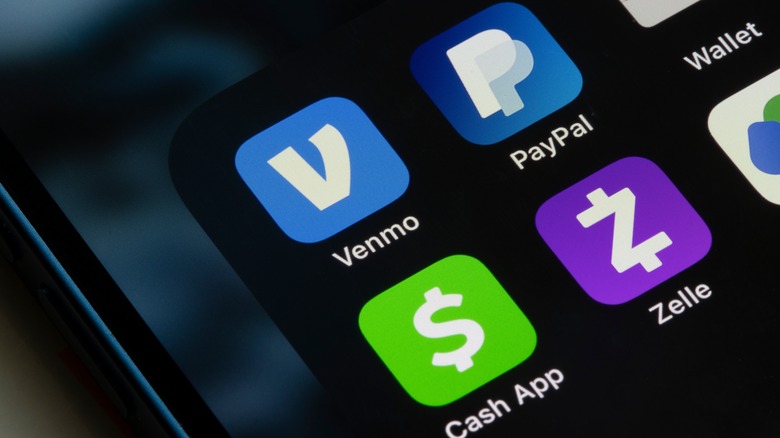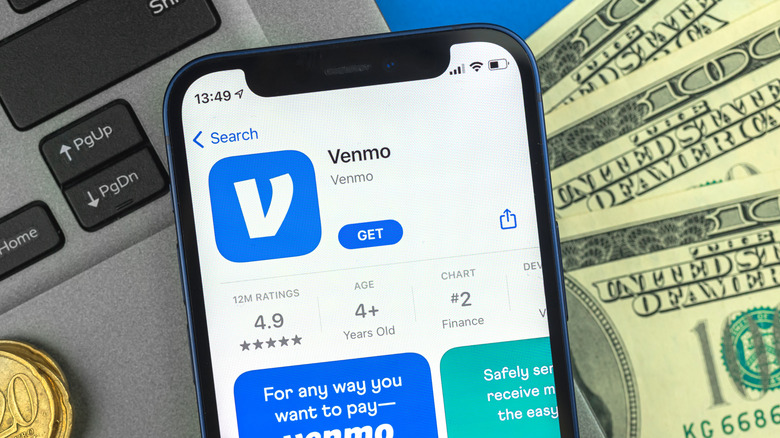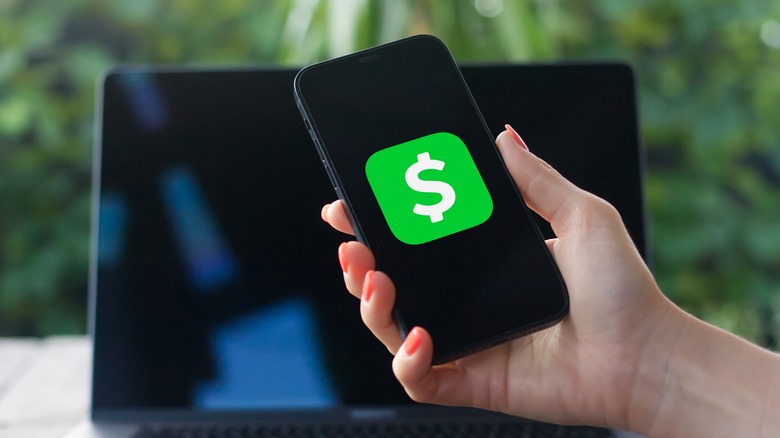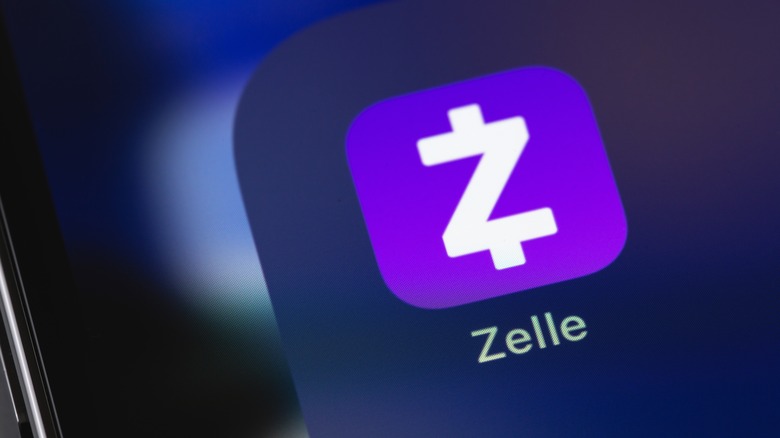Cash App, PayPal, And Other Money Sharing App Scams To Avoid At All Costs
Our phones have made it easier than ever to do a lot of things when it comes to our money. From mobile banking and investing to budgeting and couponing, the monetary tasks our devices can carry out are vast and versatile. Among the most versatile features most smartphones allow for is the ability to share money through the use of apps such as Cash App, Venmo, PayPal, and Zelle to name a few. These apps typically link up with your bank account to initiate your transactions electronically. Whether you're a freelancer getting paid for a project, splitting a restaurant bill with friends, or even paying rent, these apps give users of every experience level unmatched speed and convenience when it comes to sending out or receiving cash.
However, while most of these apps are safe on their own, there's always something to watch out for when money is involved. The tricks and tactics of scammers to con innocent individuals out of their cash continues to evolve as the popularity of money sharing apps continues to rise. Without knowing what to look out for, you could wind up in a frustrating situation where your hard-earned money and sensitive information is in serious danger. Just as with scam websites, it's important to pinpoint the signs as soon as possible and know what actions to take to avoid further damage. Here are some of the most common tactics used by money sharing app scammers you should know.
Upgrading your account
Scams often conjure up the image of someone trying to steal their money or information. But the reverse is also true for other kinds of scam attempts. Many scammers have found deceitful ways to appear that they're giving you more money than you could imagine — only to leave you more broke than before.
Among these tactics is one you might encounter while completing a transaction where someone is paying you. On top of the agreed-upon payment, the buyer might claim to only use a business account of whatever service the transaction is being done on and will need to send an additional $300 in order to upgrade yours. They will then ask that you send back the $300 as soon as they send it out. Some may even share a fabricated confirmation that the money has been transferred from their account.
However, it's more than likely that they have not sent you anything and will instead pester you into repaying them as soon as possible. Be wary of anyone asking to send more money than is necessary and double check any contact information sent to you, particularly their email. If their email address doesn't match the official email used by the app itself — which you can often find on the company's support page — then it's for the best to not move forward.
Accidental deposits
In another instance of scammer's overpaying to get the best of you, some go down an even more manipulative route to make their scenario seem more urgent. If you ever come across a random deposit out of the blue one day, it's possible that this is a scammer pinpointing another way to take advantage of you.
Often using stolen bank or credit card information, the scammer will send over money and claim it to have been an accidental transaction. They may even act desperate by saying they need the money for rent or similar expenses to add a sense of urgency to the dilemma. Once the money is refunded, however, the scammer will change the stolen information with their own bank account information and once the stolen account and money is reported by the original owner, it will come out of your account.
Any stranger sending you money should be an immediate red flag. Better Business Bureau representative Jennifer Adamany suggests its best to hold off from reacting to any strange requests right away, telling WTHR, "Just wait, you know, a few days to see if it removes itself. Don't be quick to act about it." Additionally, it's a good idea to contact the app's customer support number as they may be able to help reverse the payment.
Impersonating family, friends, and romantic interests
One of the most deceitful cons common to see on cash transfer apps are scammers pretending to be loved ones. This can come in the form of someone passing off as a family member in a desperate situation. From needing money for everyday expenses to being stuck abroad, these individuals will do everything they can to seem as helpless as possible, urging you to send over money with great haste. What makes this trick particularly manipulative is that since apps like Cash App and Venmo were primarily designed to be used between friends and family, it may be easier to let your guard down if you believe someone close is reaching out.
Another common impersonation tactic is catfishing. This involves individuals on dating or social media apps pretending to show romantic interest by messaging and building a relationship with you. This can happen over a prolonged period of time, showering you with love and earning your trust. Eventually, the scammer will ask for money for one reason or another, whether it's to get plane tickets to come see you or to help fix their car.
Anyone asking for extreme amounts of money, especially through a cash transfer app, should treated with extreme wariness even if they claim to know you. These tactics are commonly used on older people with less experience on social media and messaging apps, so ensure that any older loved ones are aware of these scams.
Pet scams
As mentioned before, most cash transfer apps are designed to be used for use between family and friends. Because of this, they lack the high level of security you get with credit cards and getting your money back is notoriously difficult. As a result, users should be extremely cautious when purchasing anything using the app and it's probably for the best to avoid making especially expensive transactions overall. But once again, scammers know that the best way to get into people's wallets is by getting into their hearts.
Scammers will take advantage of those seeking a new furry friend by advertising a new litter of puppies or kittens and even posting fake photos. They will allow you to reserve the pet of your choice and request a deposit through a money transfer app, only to leave you empty handed as there was no litter to begin with. Similar situations can occur with apartments, houses, cars, or similar big-time purchases.
Don't make any kind of major purchase or deposit until you're sure that the source is legitimate. Looking up any previous complaints about the seller and doing an image search to see if the pictures sent to you were used anywhere else online is a good place to start. Of course, the best way to avoid any issues is by seeing whatever you intend to buy in person. A lack of communication or hesitance for verification should be a sign to not proceed with the transaction.
Customer support
A common theme surrounding most scammer attempts is creating a false sense of trust. When it comes to a money sharing app, who could be more trustworthy than someone claiming to work for the company itself?
These situations often involve a scammer aiming to impersonate a customer service representative from the company. They may reach out to inform you that your account has been hacked into or request information regarding your balance. From there, they will request personal information such as your username, password, card numbers, social security code, or bank information. They may even ask to have a "test payment" sent over through a third-party app. This can be especially damaging as you will likely have to change much of this information afterwards, which can be arduous and time consuming.
Avoid taking such messages with any seriousness, as most money transfer apps won't ever request such sensitive information. The best kind of action to take is to reach out to contact the company yourself through their official support page, where you can find out if the message is legit and report the scammer.





